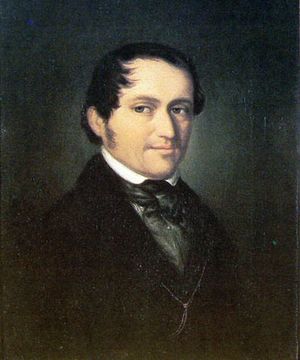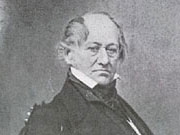Friedrich Wieck facts for kids

Friedrich Wieck (born August 18, 1785 – died October 6, 1873) was a famous German piano and voice teacher. He also owned a piano store and wrote about music. He is best known as the father and teacher of Clara Wieck, who became a child music star. Clara started playing concerts around the world by age eleven. Later, she married her father's student, Robert Schumann, even though her father strongly disagreed. Clara Schumann became one of the most famous pianists of her time. Another of Wieck's daughters, Marie Wieck, also had a music career, but she was not as famous as Clara.
Contents
Early Life and Music Journey
Wieck was born in Pretzsch, near Leipzig, in 1785. His family was not musical, but he loved music very much. He briefly attended the Thomasschule zu Leipzig in Leipzig. Later, he studied at the Torgau gymnasium, where he had his only formal piano lessons. He learned a lot about teaching music by reading books from famous thinkers like Jean-Jacques Rousseau.
He first studied to become a minister at the University of Wittenberg. But after preaching a trial sermon, he decided not to follow that path. For nine years, he worked as a private tutor for rich families. In 1815, he wrote some songs that were published and reviewed. This encouraged him to become a piano teacher in Leipzig. He also started a business selling and renting pianos. He even had a music library that Richard Wagner used.
In 1816, Wieck married Mariane Tromlitz, a well-known singer in Leipzig. She also taught his advanced piano students.
Clara's Father and Teacher
Friedrich Wieck wanted to be known as the father of a child music star. His daughter, Clara Schumann, was his second child. He planned her musical education very carefully. Every day, Clara had a one-hour lesson in piano, violin, singing, and music theory. She also practiced for two hours. Wieck used his own teaching methods. He traveled with Clara on her concert tours across Europe.
Wieck and his first wife, Marianne, had many disagreements. These differences were so big that they eventually separated. Marianne later married Adolph Bargiel.
In 1828, Wieck married his second wife, Clementine Fechner. She was 20 years younger than him. Clementine was the sister of a famous painter and a pioneer in psychology. They had three children. One of them, Marie Wieck, also became a concert pianist. However, she was not as famous as Clara. In 1844, Wieck moved to Dresden, where he lived for the rest of his life. He died there in 1873.
Wieck's Teaching Style
Wieck's home was a popular place for his piano students and other musicians to meet. He was very driven to succeed, and this affected his family and business partners.
His teaching methods were quite modern for his time. He focused on each student's unique abilities. He believed that students should enjoy making music, rather than just follow strict rules. He did not like boring, mechanical exercises. Instead, he taught students to play with a beautiful, smooth sound and a lot of expression. He also included exercises to help fingers stretch. But he made sure students did not get too tired. He limited practice hours and encouraged long walks and fresh air. He believed in developing the whole musician, teaching theory, and making sure students heard the best music performances.
However, sometimes his actions did not match his teaching ideals. Once, Robert Schumann saw Wieck punishing his young son, Alwyn, for playing the violin badly. Schumann was shocked by the scene. Wieck also published books and essays about piano playing.
Clara's Marriage and Family Conflict
A big change happened in Wieck's life when Clara fell in love with Robert Schumann. Wieck was worried that Clara marrying a composer who wasn't rich would ruin her music career. He tried everything to stop their marriage.
Clara and Robert met secretly and wrote letters. Since Clara was not yet an adult, she needed her father's permission to marry. When he refused, they asked the court for permission. Wieck threatened to disinherit Clara and take away her earnings if she married Robert. He also said he would drag them through legal battles for years.
In July 1839, Schumann's lawyer tried to talk to Wieck, but it didn't work. Schumann then filed a complaint against Wieck in court. The court set up a meeting for Wieck, Clara, and Robert, but Wieck didn't show up. He then offered to settle, but with very demanding conditions. He wanted Clara to give all her concert earnings from seven years to her brothers. He also demanded money to get her piano and belongings back. The court rejected his unfair terms.
Wieck continued to avoid court meetings. He also filed a harsh document with the court, making many false accusations against Schumann. He claimed Schumann was lazy, unreliable, and a bad composer. The court took several months to decide.
Wieck also spread mean rumors about Clara and Robert. He sent copies of his court documents to cities where Clara was going to perform. He even tried to promote another female pianist, Camilla Pleyel, to compete with Clara.
In July 1840, the court finally ruled against Wieck. It gave Clara and Robert permission to marry. Schumann then sued Wieck for spreading lies and won. Wieck had to pay them a large sum of money.
Clara and Robert married on September 12, 1840, the day before Clara's 21st birthday. For several months, Wieck refused to give Clara the piano she had played since childhood. Finally, a court order forced him to release it. By 1843, Wieck was a grandfather, as Clara had given birth to her first two children. Robert Schumann was also becoming a well-known composer.
Wieck later invited Schumann to make up. He wrote that for Clara's sake, they should no longer be distant. Clara was happy about this reconciliation, though Robert was less eager. However, Wieck later praised Schumann in his writings, calling him a top artist. In 1844, Wieck was again involved in managing Clara's career. But by 1850, he was promoting her sister Marie's career instead.
 In Spanish: Friedrich Wieck para niños
In Spanish: Friedrich Wieck para niños
 | Ernest Everett Just |
 | Mary Jackson |
 | Emmett Chappelle |
 | Marie Maynard Daly |


